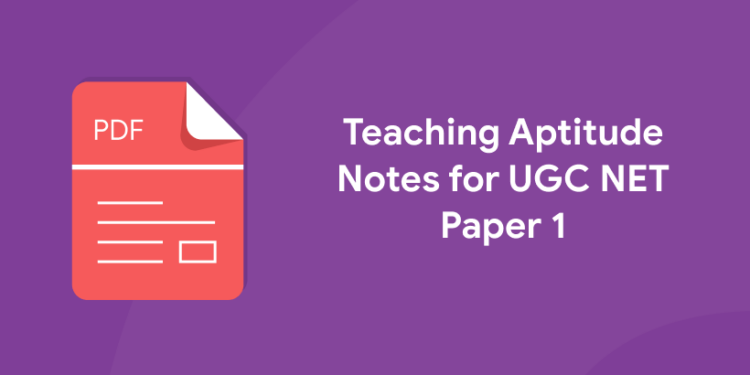Table of Contents
UGC NET (National Eligibility Test) is noted to be a national level exam which is operated by NTA (National testing Agency) on behalf of the University Grants Commission. It is for approving the eligibility of aspirants for the respective posts of ‘Assistant Professor’ or ‘Junior Research Fellowship’.
The UGC NET 2022 online registrations and application shall begin in March 2022 on the official website after the release of the official announcement.
Teaching Aptitude – UGC NET
The Teaching aptitude directs to a person’s innate capacity to teach. Similarly, it can be described as a person’s ability to teach once they have obtained the requisite instruction. Teaching Aptitude is the method of sharing your knowledge and supporting others to achieve their goals.
NTA had included teaching aptitude in UGC NET Paper 1 as a topic to examine the proficiency of candidates in the education field. It has included almost 10-12 marks in the exam. So, if you are practicing for NET Exam, then you should aware of UGC NET Teaching Aptitude.
Here, we have shared the complete details of Teaching Aptitude for UGC NET like syllabus, books, notes, important questions asked in the previous exam, and more.
Download Entri App for Teaching Aptitude notes PDF
Teaching Aptitude Syllabus for 2022 UGC NET Paper 1
Teaching Aptitude in UGC NET is the foremost unit of Paper 1. It contains 6 main topics and 19 sub-topics like the concept of teaching, level of teaching, etc. You can check the complete Teaching Aptitude Syllabus for UGC NET published by the National Testing Agency.
|
Teaching Aptitude Syllabus for UGC NET Exam 2022 |
|
| The topics of Teaching Aptitude | Sub-Topics |
| Teaching | Meaning of Teaching Aptitude, Concept, Objectives, Levels of teaching (Memory, Understanding and Reflective), Characteristics and basic needs. |
| Learner’s characteristics | Characteristics of adolescent and adult learners (Academic, Social, Emotional and Cognitive), Individual differences. |
| Factors affecting teaching related to | Teacher, Learner, Support material, Instructional facilities, Learning environment, and Institution. |
| Methods of teaching in Institutions of higher learning | Teacher-centered vs. Learner-centered methods; Off-line vs. On-line methods (Swayam, Swayamprabha, MOOCs, etc.). |
| Teaching Support System | Traditional, Modern, and ICT-based. |
| Evaluation Systems | Features and Sorts of evaluation, Evaluation in Choice Based Credit System in Higher education, Computer-based testing, and Inventions in evaluation systems.
|
The students should observe the syllabus and also the study materials to elevate their exam preparation for the UGC NET exam. Here are the precise notes for the exam preparation.
The Objective of Teaching
The primary objective of teaching covers various types of planned learning outcomes.
- Acquisition of knowledge
- Development of Understanding
- Development of contextual, intellectual, and subject-specific skills
- Development of values
Nature and characteristic of Teaching
Teaching is a social and cultural procedure, which is designed to allow an individual to learn something in his life. We can explain the nature and features of teaching in the following way: –
- Teaching is a whole social process- Teaching is launched for society and by society. With ever-changing social ideas, it is not feasible to represent the exact and permanent nature of teaching.
- Teaching is sharing information- Teaching tells students about the things they have to know and students it cannot find out by themselves. Communication of knowledge is an important part of teaching.
- Teaching is an interactive approach Teaching is an interactive procedure between the student and the teaching sources, which is crucial for the guidance, progress, and development of students.
- Teaching is a process of evolution and learning.
- Teaching causes a behavior change.
- Teaching is an art and also science.
- Teaching is a face-to-face encounter.
- Teaching is visible, measurable, and flexible.
- Teaching is a professional occupation:- Every successful teacher is expected to know the general methodologies of teaching-learning situations.
- Teaching encourages learning.
- Teaching is both a conscious and an unconscious technique.
- Teaching is from remembrance level to reflective level.
- Teaching is a continuum of activity, training, instruction, and indoctrination.
Levels of Teaching
The prevalent entity of teaching is to create the overall character of the learners and it grows around the development of learner’s capacity, thinking, and change in the conduct of students.
Different level of Teaching
- Memory Level of Teaching
- Understanding the Level of Teaching
- Reflective Level of Teaching
Important Points on Memory level teaching (MLT)
- Memory level teaching highlights the representation of fact and information and it’s all about CRAMMING.
- Knowledge or information is acquired by the learner through the memorization process.
- It is the initial phase of teaching and affects the habit of ROTE Learning facts and subject matters.
- It furnishes the students with the power to maintain and replicate the learned subject.
- It covers only the knowledge-based ideas of Bloom’s Taxonomy. At this level, the student learns to recognize, determinate, or remember the objects, events, ideas and retain them in memory.
- The teacher acts in a very dominating and authoritative role while training.
- The evaluation system especially includes Oral, Written, and easy type-examination as well systematized and is simple so that it can be achieved through rote learning.
- The role of the teacher is central (Primary & active) and that of the student is secondary (Secondary & Passive).
- Memory level teaching does not enhance intelligence and increases students’ capability but this is needed for other kinds of teaching levels.
The Herbartian theory of apperception sustains that young children’s mind is ready for perceiving themselves and the world around them. Their mind is ready for a great mass of objective information including notions, elements, structures, models, and theories. They can receive and maintain information about a large number of things, objects, and material through memorization.
Classification of memory:
- Immediate memory: when a recall is quick.
- Permanent memory: the recalling of ideas for a longer time.
- Personal memory: while recalling past experiences, we recognize our personal experiences.
- Impersonal memory: remembering from books, and companions.
- Active memory: take action to remember past experiences, recalling answers in exams.
- Passive memory: recall experiences without effort.
- Mechanical memory or physical memory: body becoming traditional of doing any task frequently.
- Rote memory: stuffing facts without understanding.
- Logical memory: to learn something by using intelligence and its recalling when required.
Important Points on Understanding Level of Teaching (ULT)
- Memory level teaching is the requirement for the understanding level of teaching as it talks about the conception of principles, theory, and other key crucial facts.
- This helps to create the thinking level of students to make use of their gained knowledge based on formerly known facts and subjects.
- The teacher demonstrates to the student the relationship between principles and facts and teaches them how these principles can be used.
- It concentrates on mastery of the subject.
- It delivers more and more options for the students to acquire skills of ‘Memory + Insight’.
- The evaluation system of this level is mostly objective-type questions and essays.
- Student and teacher both play a functional role in the Understanding level of teaching.
Morrison has split the understanding level of teaching into 5 steps;
- Exploration: testing previous knowledge, exploring the content.
- Presentation: content is given, diagnosis, and recapitulation till the students understand.
- Assimilation: generalization, individual activities, performing in laboratory and library, the test of content.
- Organization: students are equipped with the occasions for representation.
- Recitation: The student demonstrates the content orally.
Important Points on Reflective Level of Teaching (RLT)
- Reflecting on something indicates offering careful thought to something over some time. It also indicates thinking intensely about something.
- It speaks about both ‘Understanding level’ & ‘Memory Level’ teaching and its problem-centered.
- Its primary objective is to create problem-solving, critical and constructive, independent, original thinking.
- At this level, the focus is laid on recognizing the problem, describing it, and finding a solution to it. The student’s original thinking and creative abilities evolve at this level.
- A student is Core ‘Active & Primary’ when the Teacher becomes ‘Secondary & passive’ in this level.
- In the Reflective level of teaching (RLT) Hunt is the major Booster. It includes ULT and MLT. It is problem-centered teaching. The students are supposed to adopt some kind of research approach to solve the problem. The classroom environment is to be adequately ‘Open and Independent’.
- Hunt molded the reflective model of teaching which goes through the different steps including forming a problematic situation. Develop and confirm the hypothesis, data analysis, and test the hypothesis around the problem.
- An essay-type test is used to assess the learning process.
- The teaching at this level is completely learner-centered.
For More Pieces of Information, Download the Entri App Now
UGC NET – Teaching Aptitude Books
Have you been confused about the preparation in an organized manner? Here are some most reasonable books for UGC NET Teaching Aptitude proposed by the toppers. You can direct them for UGC NET Paper 1 preparation and making notes.
| UGC NET – Teaching Aptitude Books | Author |
| NTA UGC NET/SET/JRF – Paper 1: Teaching and Research Aptitude by Pearson | KVS Madaan |
| NTA UGC NET / SET / JRF – Paper 1 Teaching and Research Aptitude | Harpreet Kaur |
| Trueman’s UGC NET/SET General Paper I – Teaching & Research Aptitude | Sajit Kumar, M. Gagan |
| NTA UGC NET / SET / JRF – Paper 1 Teaching and Research Aptitude | Arihant Experts |
| NTA UGC NET / SET / JRF – Paper 1: Teaching and Research Aptitude | Dr. Usha Rani Jain |
How to Prepare for UGC NET Teaching Aptitude Exam
We have equipped you with some tips that will assist you to crack UGC NET with good marks. Go through the tips and execute them in your preparation.
- Firstly, it is very crucial for a candidate who is taking up the UGC NET Exam to go through the UGC NET Syllabus and Exam Pattern.
- Being thorough with the syllabus will help you to be excellent with the UGC NET examination and also to prepare for studying.
- After knowing the UGC NET Syllabus, make a study plan by letting more time for subjects that you find are hard and less time for subjects that you feel are comfortable.
- Also, know your strength and weakness in each subject before making the study plan.
- As it is a Teaching exam, the major vital section is UGC NET Teaching Aptitude.
- The UGC NET Teaching aptitude contains eight topics:
- Teaching-Nature
- Characteristics
- Objectives and Basic requirements
- Learner’s characteristics
- Factors affecting teaching
- Methods of Teaching
- Teaching Aids
- Evaluation systems.
The study notes provided here have connected all these topics and explained them in an easier way. Along with these notes, it is good to have explored the UGC NET Teaching Aptitude Books that cover all the topics. Make sure you have the right book for practice that will help you to get good marks.
Apart from all these tips, it is very crucial to be confident and stay positive. Without that nothing can be accomplished. Stay clear and attain your goals.
Students training for the UGC NET Paper 1 comprehend that Teaching Aptitude is one of the most significant sections of the paper 1 syllabus. The primary objective of UGC NET EXAM PAPER is to access the teaching and research quality of the candidates. Through this article, the Entri Learning App is desired at collecting all required details and UGC NET Paper 1 Notes for better study.
Download the Entri Learning App for Pieces of Information Regarding UGC NET!













